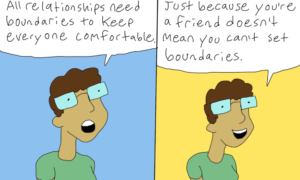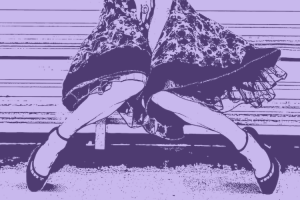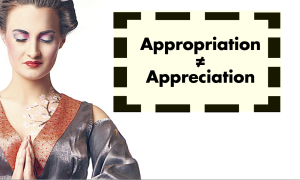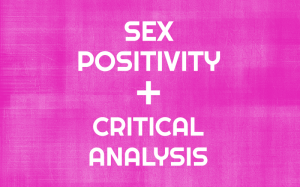“It’s that bone gnawed moment
when you realize ‘The Community’ will do nothing
to stop him from showing up at your backdoor
in the middle of the night
with the rifle he bought for the revolution”
—Leah Lakshmi Piepzna-Samarasinha, “so what the fuck does consciousness mean anyway”
There aren’t a lot of things I know for certain in this life, but there is one thing I have known for a long, long time: What lives at the heart of abuse is fear – and the power to turn that fear into violence and control.
When we live in fear, when all we have known for all our lives is fear, we are capable of transforming even the best causes and ideas into weapons of abuse – even the cause of social justice.
Let me tell you a story to show you what I mean: A few years ago I took a deep breath, looked one of my closest friends in the eye, and told him that I thought he should stop beating up his boyfriend.
He blinked at me in surprise. He shook his head, as if he couldn’t believe what I was saying. Then he said, “But it isn’t abuse if I hit him. I’m more oppressed than he is.”
It was my turn to shake my head in disbelief as I struggled to get a grip on what was happening, what was true, what I believed, what my responsibility in the situation was.
It was true that my friend was, on a systemic level, “more oppressed.” He was racialized, and his boyfriend was white. He was raised in a working class family, and his boyfriend was upper middle class.
Like me, my friend had grown up knowing trauma after trauma as a result of systemic oppression, while his boyfriend had lived a life of relative privilege.
In feminist and social justice communities, intimate partner violence, or domestic abuse, is usually understood as the violent use of power by one partner to control and terrorize the other.
Feminism, anti-racism, queer and trans advocacy, and other kinds of social justice-based thinking also recognize that people of certain identities – for example whiteness, masculinity, and heterosexuality – are given greater power and privilege in society.
Because of this social power imbalance, social justice communities tend to believe that it is much easier for men to abuse women, white people to abuse people of color, and so on. Social statistics on intimate partner violence support this belief. And this is what I have always believed, as a feminist and activist.
But in that moment with my friend, I was forced to wonder, does this mean that a “more oppressed” person can never be responsible for abusing a “less oppressed” person? Can a woman never abuse a man, or a racialized person a white person?
And how many times had I, in moments of fear, terrified of being abandoned yet again by a white, cisgender male partner, resorted to using the only power I had – the language of feminism and social justice, words that had given me strength and saved my life when no one would – to try and seize control of my relationships?
“If you leave me, then you’re just as racist as all the other white gay boys. You don’t want have sex with me anymore because you’re transphobic. I’ll scream at you and call you whatever I want – don’t tone police me.”
The thing is, I believed those things when I said them, believed them with all my traumatized, terrified trans girl of color heart. A part of me still does.
Because it’s true that social oppression plays itself out in romantic and sexual relationship. Too often, privileged people hurt and exploit their marginalized partners and are never held accountable for their actions.
But there is a difference between expressing oppressive relationship dynamics in order to expose privilege and incite self-reflection, and manipulating the language of social justice to win a fight with your partner.
There is a big difference between pointing out that your partner is more privileged than you and using that fact as an excuse for hitting them.
This conversation is so, so complicated and scary to open up, because it forces us, as feminists and activists, to question the foundations of our beliefs about identity, power, and violence. It forces us to question ourselves and what we are doing, in the world and in our bedrooms.
But I think we need to go there.
We need to look at abuse through a more complicated lens.
We need to learn to understand what is happening in our own relationships not just by ticking off identity boxes, but by deeply and carefully examining specific behaviors and the motivations that can lead to violence.
We need to start looking at the ways in which social justice ideas – the same ideas that liberate and empower us – can also be used to harm and dominate people.
(And no, to privileged folks reading this article, this is not an excuse to shut down or ignore your racialized/disabled/transgender/otherwise marginalized partner when they tell you that you’re being oppressive to them. If anything, this is about learning how to listen more carefully to what they’re saying, and why they might be saying it. Please check yourselves.)
So let’s begin.
Let’s go slowly and carefully, remembering to love ourselves through the process. Because to me, social justice has always been about learning to love, and love better.
The following is a list of signs that social justice language is being used abusively in a relationship. To write it, I did an informal survey of my own queer, feminist, and social justice communities.
1. Using Identity to Avoid Accountability for Physical or Emotional Abuse
I want to take a stand here and say that abuse is always abuse, no matter who carries it out. I also want to suggest that anyone can perpetrate abuse given the right context – no matter how they identify.
So, returning to when my friend said to me, “But it isn’t abuse if I hit him. I’m more oppressed than he is,” I have to disagree. Simply experiencing more oppression than someone else doesn’t automatically free us from responsibility for our actions.
Claiming an oppressed identity isn’t a get-out-of-jail free card for physical or emotional violence.
However, it’s equally important to understand that not all violence in a relationship is abuse – some violence is self-defense, which I would argue is an acceptable use of force.
So if my friend had said to me, “But it isn’t abuse when I hit him – I’m trying to stop him from hitting me,” that would be a totally different conversation.
Or if he had said, “But when I hit him, it’s because it’s the only way I can protect myself from his using his race and class privilege to hurt and control me,” that also would have been different – and more complicated.
But as we continued to discuss the situation, it became clear that my friend was not defending himself from being attacked. Rather, he admitted, he was lashing out at his partner in response to his own insecurities.
And he was using his identity as a person of color with a working-class background to avoid taking responsibility for that.
None of this means that marginalized people shouldn’t name their identities and privilege disparities in intimate relationships. Privileged people need to know if they are being oppressive to their partners!
But when we talk about how abuse works and creating accountability, we need to stop looking only at people’s identities and start examining their actions and intentions.
2. Using ‘Desirability Politics’ to Coerce Someone into Sex or Sexual Activity
In social justice communities, the conversation about oppressive standards of beauty and sexual desire has just begun. It is a powerful, extremely painful conversation that is also extremely necessary.
We need to talk about how trans folks, fat folks, disabled folks, elders, and people of color are far too often portrayed as ugly and undesirable in the media. We need to talk about how this dynamic plays out in real life as individuals being ridiculed, harassed, shamed, and romantically or sexually invisibilized in awful, traumatic ways.
I especially need to talk about this with my partners, who are often cis men who may not realize how society sexually fetishizes and exploits trans women of color – who may intentionally or unintentionally fetishize and exploit me.
But there is a blurry line between acknowledging how hurtful “desirability politics” can be and actually using them in a sexually manipulative or coercive way.
In abusive relationships where “desirability politics” are being leveraged manipulatively, the conversation boils down to “you should have sex with me because you’re sexually privileged and I’m not. If you don’t have sex with me, you’re being oppressive.”
But bringing politics in sexual coercion doesn’t change the fact that it’s coercion – no one should make you feel guilty for not having sex with them.
3. Disguising Putting Down and Shaming Your Partner as Calling Out Oppression
In many feminist and activist communities, it’s common to place value on the practice of “calling out” individuals for oppressive behaviors. Call-outs are more or less confrontational, and involve educating (sometimes very aggressively) people about how their use of social privilege can hurt or marginalize less privileged folks.
Call-outs can be incredibly important and useful in intimate partnerships. For example, most trans people I know who date cis people have had to correct their partners at some point or other about how to use pronouns correctly or how to respectfully talk about our bodies (yeah, it’s unfortunate).
But calling out takes an abusive turn when it isn’t targeted to specific oppressive behaviors and becomes more about instilling a constant sense of shame and uncertainty in a partner.
This kind of “calling out” often looks like attacking someone’s identity for no reason, or to dominate them. Examples of this might look like:
“If you weren’t so privileged, then you would know why you shouldn’t see friends without asking me first.”
“Only my feelings about this conflict matter, because you’re privileged, so get over it.”
“Everything you do is wrong, and you’ll never be able to change it because you’re [insert privileged identity here].”
When call-outs are less about stopping someone from being oppressive and more about establishing control over them, they stop being call-outs and start becoming put-downs and shaming.
4. Forcing Someone to Stay in a Relationship for ‘Anti-Oppressive’ Reasons
A key aspect of many abusive relationships is emotionally blackmailing the abused partner into staying in the relationship.
Social justice ideas can be twisted to this purpose in the same way that the idea of love is frequently worked into manipulation tactics – as in, “If you loved me, you wouldn’t even think about leaving.”
The social justice version of that is, “Being anti-oppressive means staying with me, no matter how I hurt you.”
And this is difficult for me to write, because even as I type the words, I don’t want to believe it – I don’t want to believe that anyone is capable of using the beautiful, revolutionary ideas of social justice for something as awful as abuse.
But the truth is that any beautiful, resonant ideology can be used in violent, abusive way.
Religion has been used to abuse (“You’ll stay with me because God says divorce is wrong”), and science has been used to abuse (“It isn’t the medical definition of rape if penetration didn’t happen”).
Social justice is no exception.
The truth is that we have the right to leave the people who hurt is – even if they say they are hurting us “for the Revolution.”
5. Making an Intimate Partner Feel Responsible for Life or Death
One of the most effective ways of keeping someone trapped in a relationship is by making them feel responsible for whether you live or die.
People who strongly believe in social justice can be particularly sensitive to this, because the truth is that marginalized people are very often truly isolated and cut off from resources – this is part of the definition of oppression.
Too many times, I’ve heard friends tell me that they feel like they can’t leave their abusive relationships because they feel like their partners will die without them.
Here, the language of social justice and oppression becomes a powerful tool for abuse, because in social justice communities, we are taught to take people’s words about their oppression at face value.
So if someone tells us, “I’m oppressed and suffering, and if you leave me, I will commit suicide,” we believe them – and often, people who say this also believe it.
Things become even more complicated when there is a real dynamic of financial or physical dependence involved – disabled folks, for example, may truly need essential care from their partners that they can’t get anywhere else. Trans folks who can’t find work due to discrimination may depend on their cis partners for financial support.
There are no easy answers when it comes to questions like this.
However, it’s important to remember that there is a difference between supporting someone financially or providing them with necessary physical care, and giving someone love or sex.
And I believe that social justice is about community – meaning that no one person should ever be made responsible for another person’s life. If someone needs support to live, then it’s the whole community’s job to provide that support.
Placing that burden on a single partner is neither realistic nor acceptable.
6. Choosing to Call Out Some Power Dynamics While Ignoring Others
When social justice politics are being used abusively, only certain power dynamics get talked about: the power dynamics that help the perpetrator of abuse maintain control and avoid accountability.
In situations like this, “social justice” becomes oversimplified, boiled down to a few key concepts that tailored specifically to assist the perpetrator of abuse in gaslighting and emotionally blackmailing their partner.
Someone who is using social justice concepts to abuse might choose to focus only on the fact that their partner has more racial privilege than them while ignoring the fact that they have more money, physical strength, or education.
One huge power dynamic at play here is the ability to fluently speak the language of feminism and anti-oppression itself – having the education and mental capacity to think and talk about one’s experiences in terms of systemic power and privilege is not something everybody has access to.
Using social justice to abuse often looks like one partner is constantly calling out the other, but doing very little self-reflection on their own privilege or oppressive behaviors.
True social justice work in intimate partnerships is sensitive, nuanced, and looks for the oppressor within as much as it points at the oppressor without. It seeks to end violence and recognize the full, flawed humanity of everyone involved.
Abusive social justice language is simplistic, individualist, and seeks to criticize and dehumanize others.
7. Using Oppression to Deny One’s Own Agency
The abuse of social justice language to attack and dominate intimate partners is based on the compelling, yet deeply flawed idea that experiencing oppression completely absolves us of responsibility and agency for our own actions, our own lives.
Whole communities of social justice-minded people fall into this trap because it is an easy answer: It separates people into oppressors and oppressed, freeing us from the painful, complicated messiness that intimate partner violence so often entails.
This is what allows people to say, “I had to hit him. I had no choice, I’m oppressed” or “I had to make her stay with me – oppression means that no one will love me unless I make them.”
Sometimes, I am so tempted to believe that every time I’ve hurt a partner, every time I’ve crossed a boundary, every time I’ve done something that I later regretted, that I didn’t have a choice.
After all, I’m a trans woman of color – I know what it means to be oppressed. To experience oppression means that my body, my mind, are treated like some kind of disgusting, unlovable disease.
It’s so much easier, so much more appealing, to look at how I’ve been traumatized and hurt than to ask myself how I might have hurt someone else. It’s so much simpler to blame society for making us violent, than to ask ourselves how we could stop.
But there is always, always a choice. If we have the strength and resilience and ingenuity to survive oppression, then we have the strength to choose not to abuse each other.
Because there aren’t many things I know for certain in this life, but there is one thing that I am starting to learn: We can choose a love that doesn’t hurt. A better love is possible, has always been, is already here.
[do_widget id=’text-101′]
Kai Cheng Thom is a Contributing Writer for Everyday Feminism. She is a Chinese trans woman writer, poet, and performance artist based in Montreal. She also holds a Master’s degree in clinical social work, and is working toward creating accessible, politically conscious mental health care for marginalized youth in her community. You can find out more about her work on her website and at Monster Academy.
Search our 3000+ articles!
Read our articles about:
Our online racial justice training
Used by hundreds of universities, non-profits, and businesses.
Click to learn more





















